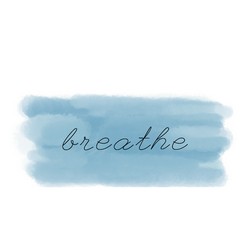College is a time considered to be the best four years of a student’s life. It is all about being independent, making new friends, and challenging yourself to be a better student and future employee. While this journey can be exciting for students, it can also cause stress.
According to the National College Health Assessment, 44.4 percent of university students recorded that they felt more stress than average over the last 12 months (ACHA 2018).
Stress is a normal aspect of our lives that never goes away, nevertheless you must learn how to manage it. Students do their best to remain calm and stay positive, but responsibilities can lead to serious stress levels that may affect their well-being.
Several coping mechanisms can help manage stress such as: attending therapy, exercising, and taking time to rest. However, the simplest yet most effective way to cope with stress is through breathing.
During a mental breakdown or a period of overwhelming thoughts, take a breath – breathe in, breathe out. Breathing is a powerful process that immediately relaxes the body; breathing affects you, improving mental and physical health.
Breathing exercises are something you can participate in daily to help melt away your stress. There are several different types of breathing exercises you can look into, and here are three deep breathing exercises that have been proven beneficial.
The ten-second breathing exercise is simple and works wonders. First, close your eyes and focus on just you. Imagine yourself at peace, relaxing at your favorite spot. Now, slowly take a deep breath in through your nose and count to ten. After ten seconds, gently breathe out of your mouth and repeat the process.
This method of deep breathing is effective in high-stress environments, particularly a classroom. Senior English education student Erica Autiero said that this breathing technique is used in one of her classes. When asked how effective she believes this method is Autiero said, “I think it relieves stress – it calms my nerves. It really does calm people down.”
With this exercise it only takes ten seconds to relax, so practice, implement daily, and drop your stress.

Another method of deep breathing is diaphragmatic breathing. Diaphragmatic breathing means deep breathing and has a technique. Michele Van Volkom, Ph.D., Lecturer of Health Psychology, is an expert on this breathing exercise. Van Volkom describes the process of diaphragmatic breathing:
“Basically it involves having one hand on the upper chest and the other on the abdomen, closing one’s eyes, and breathing deeply as one is aware of the movement of the stomach. The hand on the upper chest should be as still as possible. When we concentrate on the act of deep breathing by engaging both the diaphragm and the lower abdomen, it can bring down our stress levels.”
Diaphragmatic breathing is a breathing exercise that strengthens your entire body. During times of stress, focus on your breathing and let yourself rest. If you choose to utilize this method, try to make it into a routine– it will benefit you in the long run.
A breathing exercise known as “4-7-8” breathing is a great way to manage your stress and shut off your brain. This is a quick and easy way to show stress that you won’t allow it to tear you down anymore. As always, close your eyes and picture yourself at peace.
Next, inhale through your nose for four seconds. Once that is done, hold that breath for seven seconds. Keep your eyes shut and imagine that relaxing place. Finally, exhale through your mouth for eight seconds and repeat the process.
Senior english student Gabby Ciervo struggles with her stress, but she does her best to practice this method to alleviate her stress levels. Similar to most students, she talks about how stressed she is until she hits her breaking point.
Ciervo said, “I don’t breathe when I talk. I try to take a lot of deep breaths, and it makes me feel better. I feel a lot calmer and less nervous.”
It can be difficult, but students must prioritize downtime to rest and reflect on themselves. Feeling good mentally is just as important as feeling good physically.
The one thing that is successful in managing stress is the one thing we do daily: breathe. There are several breathing exercises to help melt away your stress, and these three are simple enough to practice right away.
Remember, when life gets the best of you, just breathe.
IMAGE COMPILED by Chloe Barone
PHOTO TAKEN by Chloe Barone



